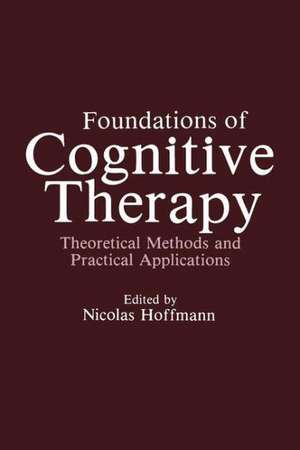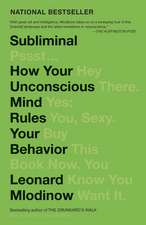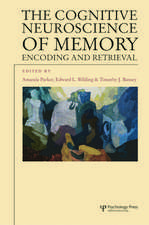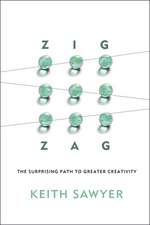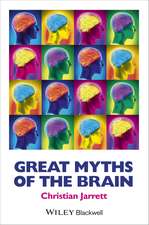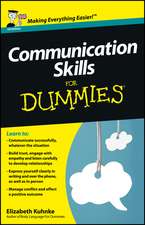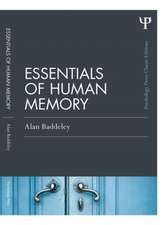Foundations of Cognitive Therapy: Theoretical Methods and Practical Applications
Editat de Nicolas Hoffmannen Limba Engleză Paperback – 26 sep 2011
Preț: 385.08 lei
Nou
Puncte Express: 578
Preț estimativ în valută:
73.69€ • 78.79$ • 61.44£
73.69€ • 78.79$ • 61.44£
Carte tipărită la comandă
Livrare economică 17 aprilie-01 mai
Preluare comenzi: 021 569.72.76
Specificații
ISBN-13: 9781461296485
ISBN-10: 146129648X
Pagini: 256
Ilustrații: XIV, 238 p.
Dimensiuni: 152 x 229 x 13 mm
Greutate: 0.35 kg
Ediția:Softcover reprint of the original 1st ed. 1984
Editura: Springer Us
Colecția Springer
Locul publicării:New York, NY, United States
ISBN-10: 146129648X
Pagini: 256
Ilustrații: XIV, 238 p.
Dimensiuni: 152 x 229 x 13 mm
Greutate: 0.35 kg
Ediția:Softcover reprint of the original 1st ed. 1984
Editura: Springer Us
Colecția Springer
Locul publicării:New York, NY, United States
Public țintă
ResearchCuprins
1 Cognitive Therapy: Introduction to the Subject.- 1. Definitions.- 2. Cognitive Therapy.- 3. The Common Elements of Cognitive Therapies.- 4. The Present Theoretical Status of Cognitive Therapy.- References.- 2 Developmental Cognitive Theory, Personality, and Therapy.- 1. Principles of a Genetic Theory of Cognition.- 2. Personality and Personality Disorders from the Viewpoint of the Theory of Cognition.- 3. Therapy Based on Cognitive Theory.- 4. Cognitive-Theory Interpretations of Behavior Therapy.- Techniques.- References.- 3 Attitude Change and Cognitive Therapy.- 1. Introduction.- 2. Attitude and Behavior.- 3. Attitude Change and Cognitive Therapy.- References.- 4 The Problem of Attribution and Cognitive Therapy.- 1. Introduction.- 2. Classical Theories of Attribution: General Introduction and Comparison of the Theories.- 3. Aspects of the More Recent Attribution Research Relevant to Clinical Practice.- 4. Attribution Therapy.- 5. Summary and Critique.- References.- 5 Implications of Action Theory for Cognitive Therapy.- 1. Introduction.- 2. Cognition versus Reinforcement: Is There a Noncognitive Therapy?.- 3. Cognition and Emotion.- 4. Cognition and Behavior I: Cognitive Factors in the Regulation of Behavior.- 5. Cognition and Behavior II: Mechanisms of Cognitive Action Regulation.- 6. Implications of an Action-Theory Approach.- 7. Conclusion.- References.- 6 Problem Solving and Cognitive Therapy.- 1. Introduction.- 2. Problem-Solving Skills as the Therapeutic Goal.- 3. Problems and Their Classification.- 4. Cognitive Structures and Cognitive Operations.- 5. Heuristic Procedures in Problem Solving.- 6. Approaches for the Enhancement of Competence in Problem Solving.- 7. Problem Solving in Cognitive Therapy.- 8. Problem Solving under the Conditions of Therapy.- References.- 7 Cognitive Therapy in the Treatment of Depression.- 1. Overview.- 2. The Cognitive Model of Depression.- 3. Cognitive Therapy of Depression.- References.- 8 The Applicability of Cognitive Components of Behavior in Diagnosis and Therapy: Practical Approaches for a Cognitive Theory.- 1. Therapy as a Cognitive-Social Problem-Solving Process.- 2. Diagnostic Applicability of Cognitive Components of Behavior.- 3. Therapeutic Applicability of Cognitive Components of Behavior.- 4. Final Remarks.- References.- 9 The Problem of the Use of Cognitive Constructs and Cognitive Terminology: A Critical Analysis Exemplified by the Construct of ‘Learned Helplessness’.- 1. The Definition of Cognition.- 2. The Use of Cognitive Concepts in the Paradigm of Helplessness.- 3. The Use of Cognitive Concepts.- References.- Author Index.
